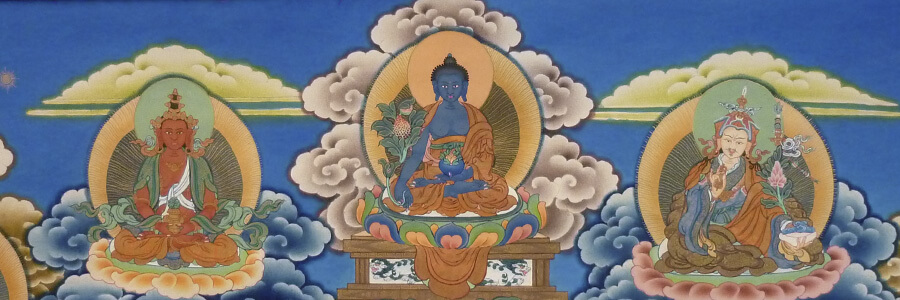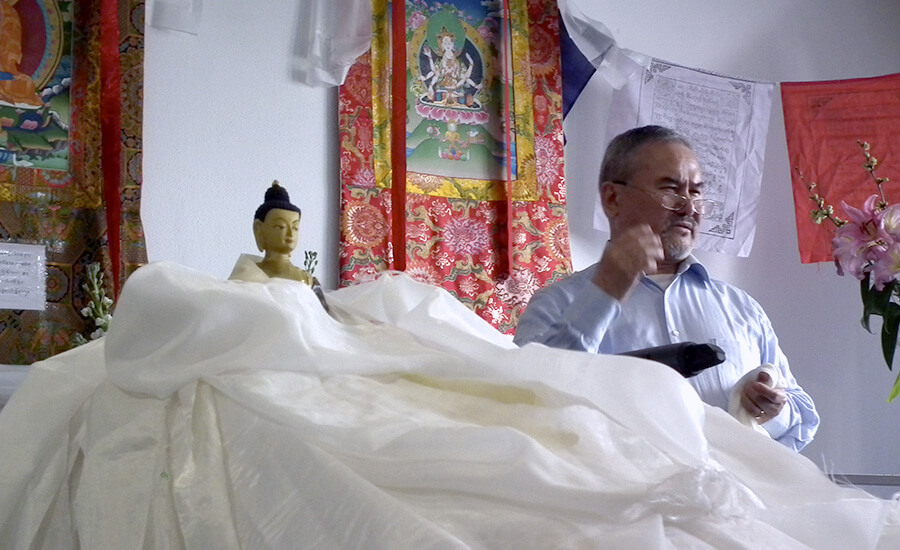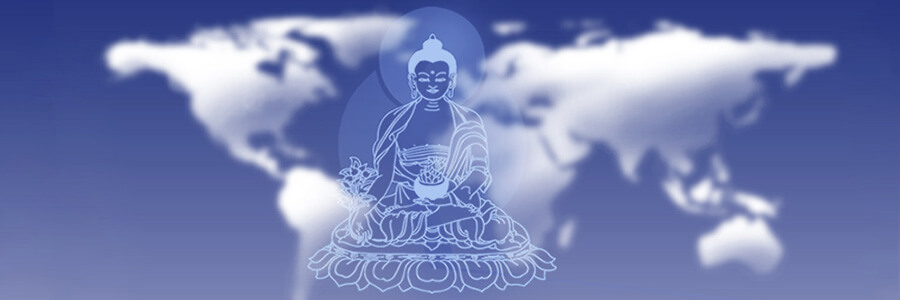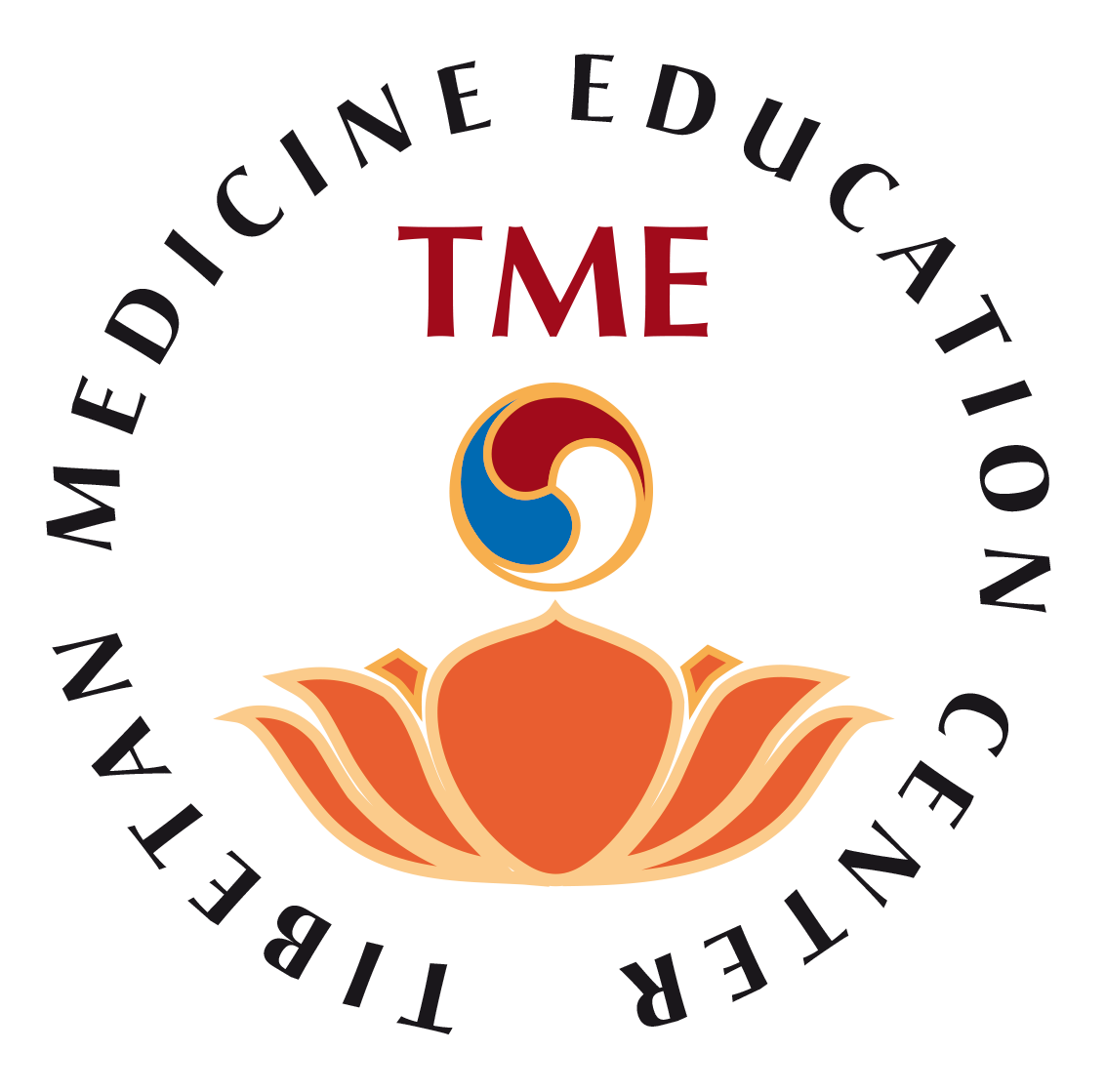Tibetan Medicine in the West
Point of view of a Tibetan doctor

This article on the situation of Tibetan Medicine in the western world, especially focuses on its practice aspect. We have then given voice to a Tibetan doctor, Amchi Lobsang Tsultrim who lives in the Netherlands, and who shares with us his experience of the new challenges Tibetan doctors have to face in the West, and how Tibetan Medicine is finding its place amongst the other medical systems.
…………………………………………………………………………………..
Dr. Lobsang Tsultrim, can you briefly introduce yourself?
I am a Tibetan doctor, living in the Netherlands.
I graduated from the Institute of Men-Tsee-Khang of Dharamsala (India), where Dr Pasang Y. Arya was my teacher. Since 1989, I have been travelling in many different European countries, and also Canada and Japan, and I have assisted many senior amchis or Tibetan doctors, such as Dr Tenzin Choedrak, Dr. Lobsang Wangyal, Dr. Kunga Gyurme Ngarongshar.
Since 2003, I am based in Netherlands and have started my own practice. Beside my practice, I give lectures and workshops on Tibetan Medicine. I also organize seminars and conferences.
 What can Tibetan Medicine offer to the West?
What can Tibetan Medicine offer to the West?
This question is a big subject, a very big subject! But to make my reply very short, I think Tibetan medicine can indeed offer a lot. Here in the West, you can find almost everything: western medicine, good doctors, acupuncturists, psychotherapists, psychologists, Chinese doctors, etc., but there are not many Tibetan doctors. Even though Tibetan Medicine is not yet as known as other medical systems, the demand is rising. In the West, there are many people who wish to take Tibetan medicine beside their regular medicines. Also Tibetan doctors are widely invited to different countries in Europe, to participate in seminars, conferences, or exhibitions, beside the medical consultations.
According to the rGyud-shi, the Four medical Tantras, the Tibetan medical system is a holistic system with a focus on balancing both mind and body. Tibetan doctors are general practitioners as well as psychotherapists. We treat most of the illnesses with Tibetan herbal preparation and by giving advice on daily life behavior and diet restrictions. Breathing exercise and relaxation of mind are given beside the treatment.
When I started my practice, I started from zero. I didn’t do any kind of advertisement. But day after day, people started to come slowly, slowly. What happened was simply that my patients themselves spread the word. So, there must be some reason for that, because here, as I said before, people can already get very good medicine from the doctors, have very good facilities with the hospitals, and are not lacking anything, but they do come to Tibetan doctors. It doesn’t mean at all that western medicine is bad. I personally believe that all medical systems share one root with different branches. These branches are western medicine, Tibetan medicine, homeopathic medicine, Ayurvedic, Chinese or other medicines. Some people get more benefit from Tibetan medicine, some people from western medicine. In this way, Tibetan Medicine can also contribute towards the human health.
From your point of view, how is Tibetan medicine perceived in the West?
I think since the ‘70s and ‘80’s, Tibetan doctors, including some senior doctors, such as Dr. Yeshi Dhonden, Lady Dr. Lobsang Dolma, Dr. Choedrak, Dr. Wangyal, Dr. Trogawa Rinpoche, have started travelling to Europe and America.
Thanks to these senior doctors, Tibetan Medicine has become popular in Europe, America, Canada and in many parts of the world. I could tell you many stories… To give you an example, when I was accompanying Dr. Wangyal to Oslo, Norway, a patient came with a severe back problem. He hadn’t been able to stand straight or bend his back for a few months. Dr. Wangyal treated him with moxa and directly the patient was able to walk and stretch. He immediately felt better. In this way, relieved patients share their experiences with others and nowadays, there are many practicing Tibetan doctors in Europe. Moreover, there are many books on Tibetan Medicine published in English and other languages. Many Tibetan doctors give workshops, courses and organize numerous conferences on Tibetan medicine.
From a general point of view, what are the main obstacles for the development of Tibetan Medicine in the West?
Do you encounter particular obstacles in your field of activities?
In general, there are no major obstacles, but there are indeed difficulties. If you practice Tibetan Medicine in the West, you must follow the rules and regulations of the country. At the moment, in many countries, Tibetan medicine is still not an officially recognized medicine. However, there are new laws for the alternative medicines. These laws should be followed respectfully. That can be very restrictive, but still, I don’t call this obstacles, I call it “challenge.” We can respond positively to these challenges by doing clinical research and by being able to prove the good manufacture of clean herbal medicines.
Also, in my practice, I am always very careful with chronic diseases such as cancer, HIV, cardiovascular diseases, high blood pressure, MS, etc. because it is important for these patients to carry on with their regular medicines.
Do you think Tibetan Medicine has a future in the West in its traditional form? Do you think that it is going to be mixed with the western culture?
In my opinion, there may be some changes with the Tibetan medicines. For instance, in Holland, there are lists of plants which are not allowed to be used, and because of restrictions of some plants and ingredients, we have to stop the production of some medicines. So we will have to find alternative means such as doing more research to find what could be used as substitutes. We also need laboratory-tested certificates to prove that the medicine is clean. Here, we are not even allowed to use the name “medicine”; we have to call it “food supplement”. Also, to make the intake our medicines easier for patients, the outlook of Tibetan medicine is changing slowly. For example, many productions of Tibetan pills are now made in capsules or in packages.
But from my point of view, Tibetan Medicine itself doesn’t need to be changed, and Tibetan doctors should remain as Tibetan doctors simply because Tibetan Medicine and studies have particular features. I’m living in the Netherlands now, but it doesn’t mean that I have to change myself into a western doctor. Of course, it may be beneficial to study other medicines also. But Tibetan Medicine should remain Tibetan Medicine. Exchanging knowledge is fine and may be beneficial to the patients, but trying to create a mixed medicine can bring confusion.
Tibetan Medicine is very much imbued with Buddhism. From your point of view, is this aspect important?
Tibetan Medicine is not only a science, Tibetan Medicine is not only an art, but it is the knowledge based on Buddhism to balance the mind and body. Tibetan Medicine and Tibetan Buddhism cannot be separated, because Tibetan Medicine comes from the Medicine Buddha, and the Medicine Buddha is an emanation of Buddha himself. Treating the mind is a unique feature of Tibetan Medicine. Problems such as stress, depression, anger can be balanced by Buddhist psychology and mind trainings. So that makes the Tibetan Medicine so special in the West.
To develop the healing energy, doctors must engage with spiritual practice such as meditation and develop love and kindness. The fundamental healing practice is love and compassion. The doctors and the patients are same human beings. All the Tibetan doctors will perform Buddha prayers before and after the treatments for healing and purification. While collecting the medicinal plants, Tibetan doctors recite the Medicine Buddha mantra to empower the energy.
And do you think Tibetan Medicine is going to keep this spiritual aspect here in the West?
Yes and no. In the West, I’ve met several Tibetan doctors, and some of them are very spiritually involved. Of course, helping suffering beings is by itself undoubtedly spiritual. But to help other suffering beings, firstly we ourselves have to be in balance. This can be done by practicing Medicine Buddha healing prayers and retreat, etc. These practices are very powerful to receive special healing energy from the Medicine Buddha, to get rid of negative spirits, whether visible or not; this gives extra power.
Tibetan Medicine is related with Tibetan Buddhism. Then, of course, giving treatment for the patients is regarded as a spiritual practice. But I learned later in my life from Dr. Pasang-la how important it is, especially for healers, doctors, therapists, or everyone who are engaged the healing, to follow Medicine Buddha retreats to empower healing energy. In the West, we are very busy due to hectic life, but we have to set up time for spiritual practice. Often patients want to come to meet Tibetan doctors as they believe that Tibetan doctors have special healing power. I learned Tibetan Medicine, and graduated many years ago, so I have some experience, but I don’t have a special power by myself. That power becomes available to Tibetan doctors through the practice of Medicine Buddha retreat and other spiritual activities.
Generally speaking, what is the situation of Tibetan Medicine in the world and what could help Tibetan Medicine find its place amongst other medical systems here in the West?
Till now, Tibetan Medicine is still not an officially recognized medicine in the West. That means patients will not get money back from the insurance and that Tibetan Medicine is often not practiced openly. For example, Tibetan Medicine is not officially recognized by the government of India, though it is practiced freely all over India. In Tibet, I don’t know, maybe Chinese government has given special consideration and has made researches on Tibetan Medicine. I heard that there are now many Tibetan hospitals, schools and research centers which produce many Tibetan medicines and also export to other countries. In India, there are many medical institutions such as Men-Tsee-Khang, Dharamsala, Chagpori – Darjeeling and Sarnath, Varanasi. In each Institution, education and research in Tibetan Medicine are carried on. There are also numerous books on Tibetan Medicine which are published. So, in general, Tibetan Medicine will continue to sow its seeds in this world of medical system. But to preserve and promote it, we have to continue clinical researches and follow the regulations of alternative medicines. Here in the Netherlands, Tibetan doctors are not recognized as “official” doctors, but we are registered under the umbrella of complementary medicines, that’s why we are still surviving. But we have to follow very strict rules. For example, we are not allowed to use of any kind of medical terms in our flyers or websites. In India, we used to say that Tibetan Medicine is very good for arthritis, rheumatism, diabetes, asthma, chronic diseases, but here it is not even possible because of the law of the country. Anyway, beside all these problems, Tibetan Medicine and doctors play an important role in the healthcare in many places of the world. That is why it is really important to work for its recognition.
But who should do this?
I think this is a matter that should concern all Tibetan doctors. Of course, big institutions such as Men-Tsee-Khang, Chakpori, Varanasi, and the Council for Tibetan Medicine are more powerful than individuals, but actually each Tibetan doctor has some responsibility in that matter. We have to put more energy into quality control of the medicine, clinical research and to preserve rare medicinal plants. There should be more research and evidences for Tibetan medicines.
In your practice, what are the general expectations of your patients? Do you think they expect something different from you than what they would from a western doctor?
Patients have a lot of expectations! Sometimes too many… Yes, patients generally expect from us something different from what they expect from western doctors. Some patients expect that we, the Tibetan doctors, can do miracle things, some expect to substitute Tibetan Medicine for western medicines, others expect to support their quality of life by following the advice of the Tibetan doctors. Groups of patients expect to receive treatment and advice on how to keep mind and body in balance. Some patients expect that we, the Tibetan doctors, can tell everything only by reading the pulse. Like this there are indeed many different expectations…
Thank you
(Article published in 2014)
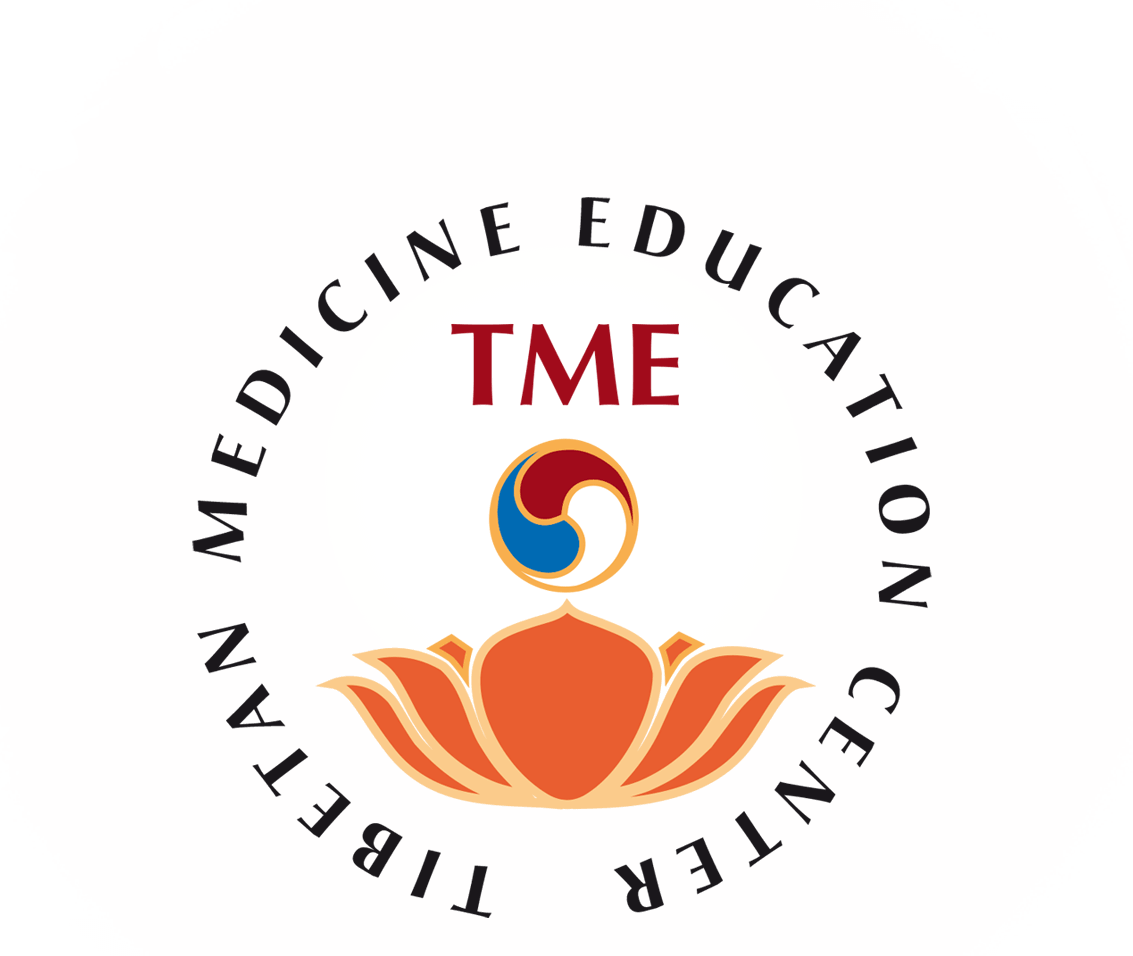
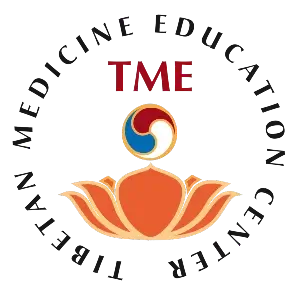
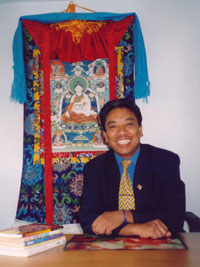 What can Tibetan Medicine offer to the West?
What can Tibetan Medicine offer to the West?